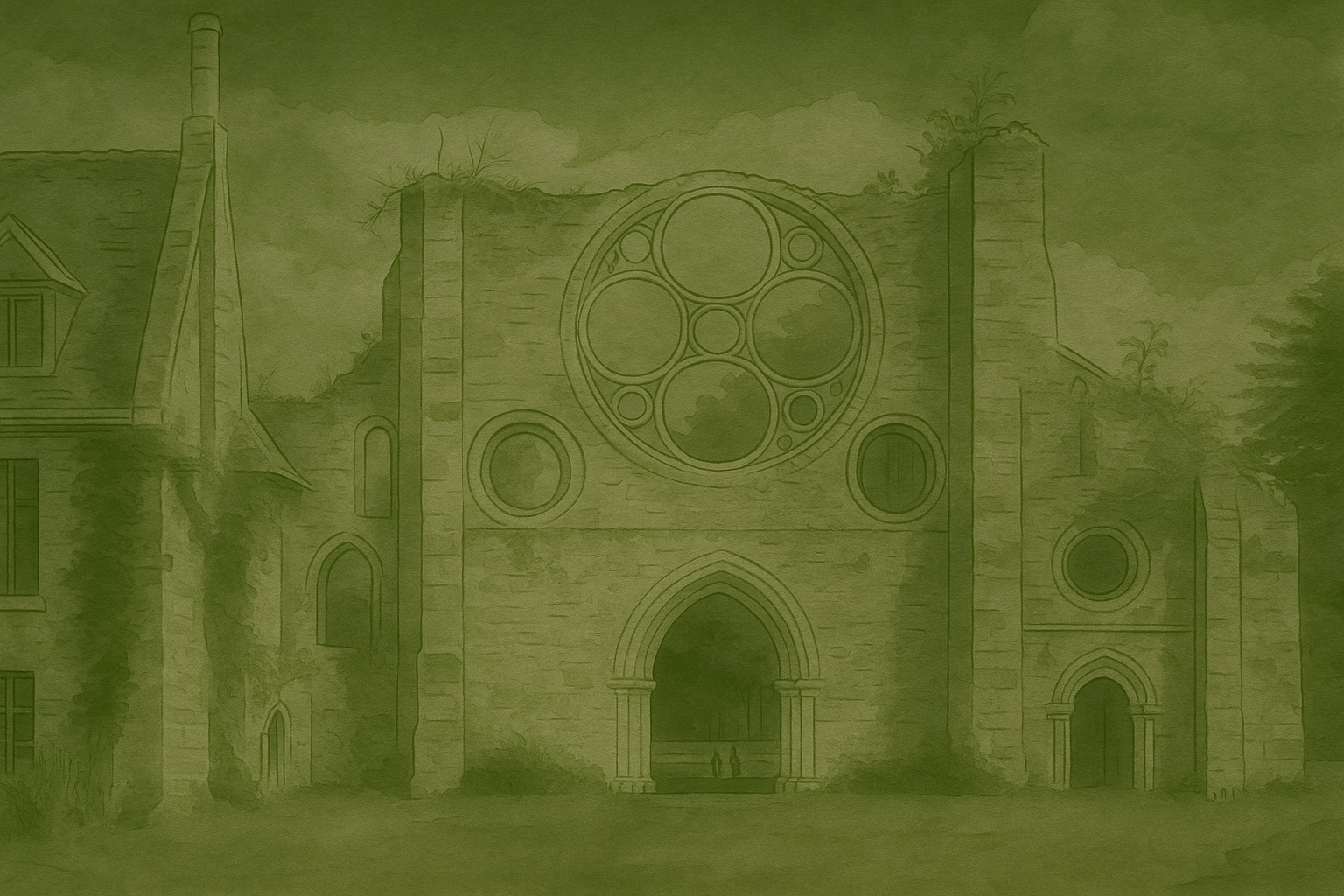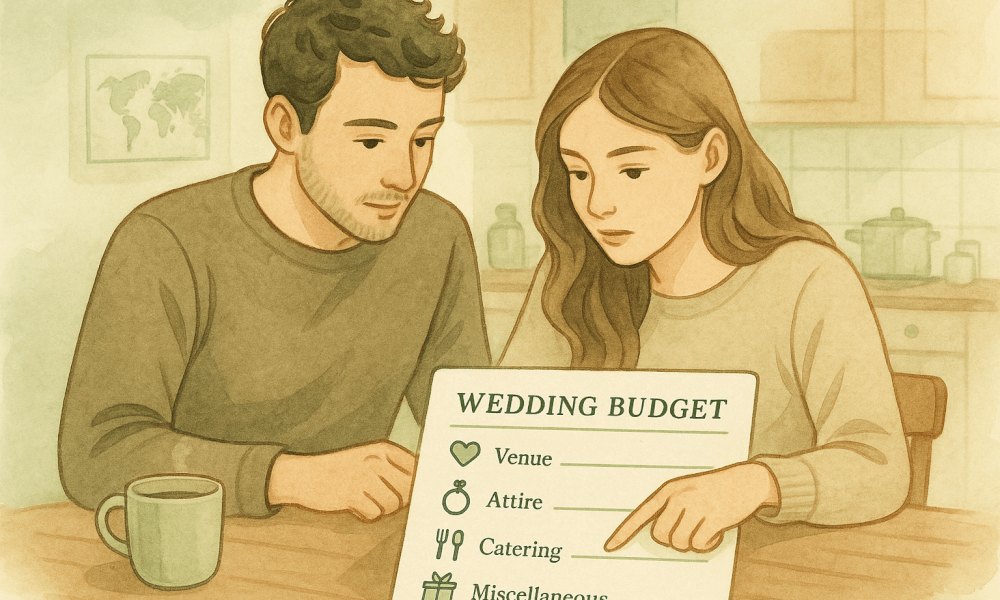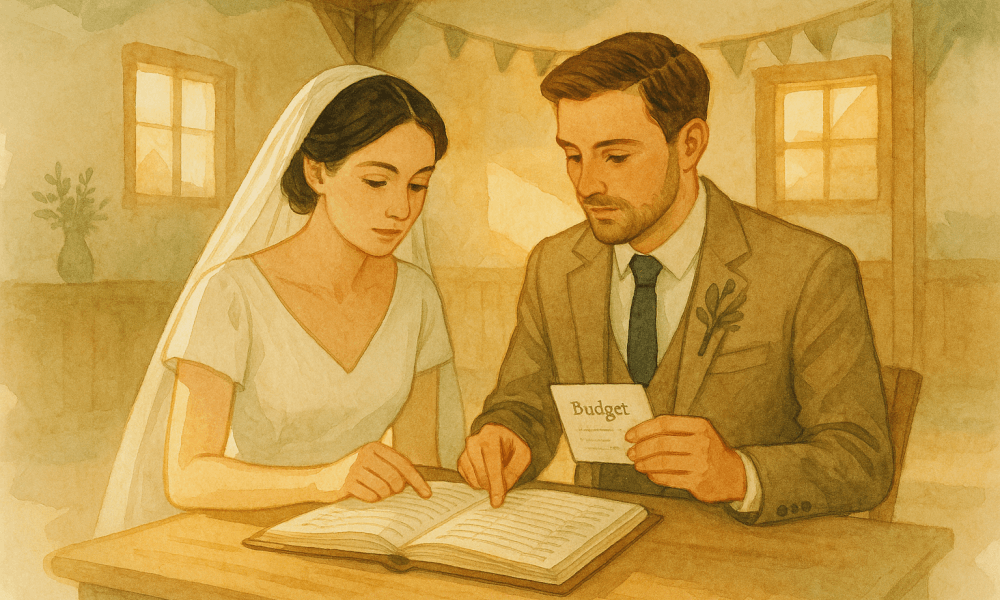Wedding costs 2025: a complete guide to estimating your budget and saving money

The cost of a wedding is probably one of the first concerns for engaged couples when they start planning their big day. Between emotions, expectations and the reality of expenses, it can be hard to find your way.
To approach this stage calmly, a simple and reliable budget framework makes all the difference. With a clear estimate and concrete benchmarks, it becomes easier to align your wishes with your budget. Whether you’re planning an intimate ceremony or a grand reception, this article walks you through the key costs, regional variations, and practical tips to control your spending without giving up what matters.
How to estimate the cost of your wedding?
Average cost of a wedding in France: updated figures
To set a realistic framework from the start, here are some numerical benchmarks.
The price of a wedding is often the first shock for engaged couples. In 2025, the average budget ranges from €16,000 to €20,000 for around 100 guests. Recent studies show a reality: 53% of couples exceed their initial expectations. This amount covers all services, from the civil ceremony fee to the bridal gown costs. The reception venue costs between €2,200 and €3,000, with venue rental prices varying by region. The caterer represents the largest share at €50 to €200 per person. Other items add up quickly: wedding photographer quotes (€800–€2,000), wedding decoration budget (8–10% of the total budget), the bride and groom’s outfits including the wedding rings (€500–€2,000). Île-de-France pulls the averages up with budgets regularly exceeding €15,000, while the cost of a church wedding remains relatively stable around €200–€500 as a donation.
Average wedding price by number of guests (50, 100, 150, 200)
These updated figures help you precisely anticipate the budget according to the size of your celebration and plan a wedding that fits your finances:
- 50 guests: Budget between €9,000 and €18,000
- Average cost for a 50-person wedding: around €13,500
- Catering: at least €4,000 (menu at €80/person)
- Venue rental price: around €3,000 depending on level of comfort
- Florist fee: €500 to €1,500
- 100 guests: Average wedding budget of €25,000
- Average cost for a 100-person wedding: about €250 per guest all inclusive
- Reception venue: €2,200 on average
- Standard caterer: €8,000 (€80/person)
- Wedding DJ price: €800 to €1,500 for the evening
- 150 guests: Budget between €20,000 and €35,000
- Average cost for a 150-person wedding influenced by the chosen level of service
- Choice between buffet, seated meal or cocktail reception
- Entertainment cost: from €1,200 to €3,000
- Catering: from €7,500 to €37,500 depending on services
- 200 guests: Budget of at least €30,000 to €50,000
- Average cost for a 200-person wedding requiring complex logistics
- Major impact on wedding expenses in France
- Need for a venue adapted to large receptions
- Wedding planner fees often necessary: €2,000 to €5,000
These orders of magnitude serve as a base to adjust each item according to your priorities.
Cost estimates by region or city (major cities vs rural areas)
Beyond the number of guests, location plays a major role.
Geography directly influences wedding organization costs, with differences that can reach 400%. A château in Pays de la Loire requires €3,000 to €9,000 for rental. A rural hall is negotiated between €200 and €2,000, perfect for a low-budget wedding.
Vendor prices also vary: a photographer costs €1,200–€2,800 in the city versus €1,000–€2,500 in the countryside. Grand Est offers intermediate rates with venues between €2,500 and €6,000. Tourist areas systematically inflate prices, making cheap-wedding suggestions more difficult. Couples in rural areas often benefit from community involvement that reduces some costs. The notary fee for a wedding remains stable at €350–€500 regardless of location. These differences can save several thousand euros on the estimate for a complete wedding.
How wedding prices have evolved in recent years (current budget trends)
Finally, understanding price dynamics helps with anticipation.

Wedding budgets rose from €12,700 in 2019 to €20,000 in 2025. This increase reflects inflation but also new expectations for the ceremony’s scale. Calculating a wedding budget has become more complex: 42% of couples reduce their guest list to control costs. 26% limit the number of vendors to stick to their initial average wedding budget. 43% take a more hands-on role in planning, seeking alternatives to cut expenses. Bank loans now concern 12% of couples facing the general rise in prices.
High-end services are multiplying: wedding planners, elaborate scenography, exceptional venues. Eco-responsibility is emerging with local vendors and organic products, influencing the overall budget. "Wedding at any cost" is a reality for 10% of couples who exceed €35,000 in total budget.
The wedding price broken down by item
After this overview, the breakdown by category allows you to set concrete priorities.
Expenses by category: venue, catering, dress and suit, rings, decoration, music, photography
To establish your average wedding budget, understanding how costs are distributed will help you prioritize spending. The caterer represents the largest share, 40–50% of the total budget. The average cost for catering alone for 100 guests ranges from €5,000 to €15,000. The rental price for a reception hall varies between €1,500 and €3,500 on average. Community halls cost €550 to €1,200, while renting a prestigious venue like a château can reach €10,000.
The wedding dress ranges from €800 to €3,500, representing a significant portion of bridal attire costs. The groom’s suit requires €300 to €1,200. The wedding decoration budget asks for €500 to €2,000. The price for a wedding DJ and musical services varies from €500 to €3,000. A photographer’s quote, which generally includes video, costs between €800 and €3,000. The cost of wedding rings adds €1,000 to €3,000 for the couple.
An estimate for a full wedding is around €13,000 to €16,000 for about 100 guests.
Expense items not to forget to avoid surprises
Some fees often escape engaged couples when calculating the initial wedding budget. Stamps and envelopes for invitations and thank-you cards can represent several hundred euros depending on your guest list. Travel and accommodation costs for vendors (photographer, DJ) are sometimes charged in addition to their base fees. Dress and suit alterations easily add €200 to €500 to the outfit budget. Staff meals (servers, technicians) should be budgeted separately from the average price for a 50-person wedding or more.
Corkage fees apply if you bring your own alcohol to certain venues, even for a low-budget wedding. Tips for vendors amount to about 5% of their invoice. Hair and makeup trials are often charged separately from the wedding day. A florist’s fee can also rise with last-minute extra arrangements. A safety margin of 10–15% of the total budget allows you to absorb these unforeseen wedding expenses in France.
Cost of a civil wedding: administrative fees and ancillary services
The cost of a wedding at the town hall sometimes surprises couples who are used to hearing that this ceremony is free. The official ceremony in front of the civil registrar indeed costs nothing. Registration fees vary by municipality: about €50 in Paris, up to €75 in some small towns.
The notary fee for a marriage is €350 to €500 if you choose to establish a matrimonial contract. Renting a municipal hall to host your guests ranges between €100 and €500, remaining accessible even for low-cost wedding suggestions. Copies of necessary certificates cost €10 to €15 per document. Minimal floral decoration starts at €150. The organization cost for a civil wedding therefore remains modest but can reach €1,000 with additional services. If you’re planning a wedding with a limited budget, this option remains the most economical.

Cost of a church wedding: donations, decoration, music, and other fees
The cost of a church wedding generates specific fees that add to the total cost of the nuptial ceremony. The parish contribution varies between €150 and €500 depending on your church. The offering to the priest is generally €50 to €150. Marriage preparation sessions sometimes cost up to €150. The organist charges between €100 and €300 for his services, making part of the religious ceremony’s animation cost. A full musical ensemble requires €200 to €500.
The floral decoration of the church represents €500 to €2,000 depending on your choices, adding to the average cost for a 150-guest wedding or a 200-guest wedding if you plan a large celebration. Candles and accessories add €10 to €50 per guest. A wedding planner can help you optimize these religious ceremony expenses. These amounts vary widely depending on the size of the parish and whether it’s in an urban or rural location.
Reducing the price of your wedding
Once the overall envelope is defined, several levers can lighten the bill without losing quality.
How to cut costs: tips and economical alternatives
Concrete strategies to significantly reduce your average wedding budget start with choosing the right date. Picking an off-season date, between October and April, can lower your costs by up to 30%. Vendors offer more favorable rates during these less-requested periods, making a low-cost wedding more accessible with suitable suggestions. Organizing your celebration on a weekday, particularly Wednesday or Friday, generates substantial savings on venue rental fees. Buffets can advantageously replace seated dinners, sometimes halving the bill. Using dried flowers, durable and economical, makes “three weddings for the price of one” possible. Local talents—amateur photographers, budding musicians—offer quality services at reduced prices. A budget simulator for weddings helps you visualize exactly where to save without sacrificing essentials, by integrating the overall organization costs.
Each targeted compromise creates a cumulative effect on the final envelope.
Prioritizing your budget: which items are essential, which can be optional
This ranking of wedding expenses in France allows you to allocate your budget intelligently according to your real priorities, whether for a low-budget wedding or a more elaborate celebration.
Benefits of budget prioritization:
- Concentrating resources on essentials: venue (€2,200 on average), caterer and the couple’s attire including bridal gown costs
- Substantial savings by identifying superfluous items like a photobooth or guest gifts, allowing for a controlled-budget wedding
- Room to handle contingencies thanks to the recommended additional 20% budget
- Better communication with families about financing and expectations regarding the ceremony’s cost
Potential drawbacks:
- Giving up some symbolic or festive elements initially desired
- Sometimes delicate negotiations with relatives about differing priorities for vendor fees
- Risk of regretting the absence of certain services (videographer, specific entertainment)
- Significant time spent comparing and choosing between vendors to establish a complete wedding estimate
The goal remains to match your wishes with the means available, without losing sight of what matters.
DIY wedding: what you can do yourself to save
- Create personalized centerpieces: recycled jars, bulk-purchased flowers (an alternative to florist prices), branches gathered from nature
- Average saving: 70% compared to professional floral arrangements
- Make stationery and signage: digital invitations, place cards from simple materials, table numbers using recycled bottles
- Create homemade guest gifts: artisanal jams, scented candles, personalized biscuits
- Unit cost cut by three compared to commercial options
- Turn pallets into furniture: rustic bar, decorative stands, directional signs
- Organize creative workshops: involve family and friends to assemble paper garlands, fans, candle holders
- A convivial moment that strengthens bonds before the big day while reducing the cost of wedding entertainment
By combining these ideas, savings add up without sacrificing style.

Off-season or weekday weddings: possible savings
Low-season periods offer remarkable savings opportunities without compromising the quality of your celebration, whether you target the average price for a 50-person or a 100-person wedding. Reception venues apply discounts ranging from 10% to 50% in autumn and winter, directly impacting venue rental prices. A prestigious estate becomes accessible with a 30% price drop outside the summer season. Caterers, photographers and florists typically offer 20% to 50% discounts during these periods, including negotiable photographer quotes. On weekdays, rates drop another 10% to 30%, making even a 150-guest wedding more affordable. This greater vendor availability allows more flexible negotiation on the wedding DJ price as well. A photographer may include extra hours at no additional cost. Venues often accept guest accommodation at preferential rates. These strategic choices can save between 20% and 50% of the overall budget while providing more personalized service, even for a 200-guest wedding.
Thus, timing choices offer a useful margin for negotiation across all services.
Detailed budget example for a low-budget wedding
Here’s how to organize a memorable celebration with €3,700 for 30 guests, optimizing each expense item, far from the traditional wedding planner price. The venue costs €500, or 13% of the total budget (an economical alternative to a town-hall wedding with hall rental). The buffet, at €40 per person, totals €1,200—your main investment to ensure guest satisfaction. A talented beginner photographer captures your moments for €600. DIY decoration, limited to €300, creates a personalized atmosphere thanks to homemade creations. A carefully curated playlist replaces a professional DJ. Outfits remain elegant with €300 for the dress and €250 for the suit. Wedding rings cost €400, essential symbols of your union. Digital invitations and the lack of vehicle rental free up funds for the essentials. This allocation concentrates 70% of the budget on unavoidable items: venue, food, outfits and rings, much more accessible than the cost of a church wedding with full reception or a notary wedding with traditional celebration.
This scenario shows that a warm celebration is possible with a controlled budget.
Resources and possible financial aids (allowances, loans, family sponsorship)
To realize your project despite a tight budget, several financial solutions are available. Town halls sometimes offer subsidies covering hall rental or catering—check with your municipality. Departmental councils grant vouchers under means-tested conditions. Some regions offer zero-interest loans specifically intended for weddings. Personal bank loans, from €1,000, finance your expenses without detailed documentation. Family sponsorship remains traditional: parents and grandparents often contribute to major costs. Crowdfunding platforms allow relatives to contribute collectively. Sponsored weddings are emerging as an innovative alternative: photographers, florists, caterers offer services in exchange for visibility. These combined resources can cover 30% to 50% of your total budget, making your ideal celebration accessible.
By mobilizing them at the right time, you secure your financing plan.
The cost of a wedding can seem impressive at first glance, but with the right tools and a structured approach, it is entirely possible to build a ceremony that reflects you without compromising your financial balance. Thanks to a precise item-by-item estimate, prioritization and exploration of economical alternatives like DIY or off-season timing, every couple can adapt their event to their means.
By keeping in mind potential hidden costs and planning a margin for unforeseen expenses, you ensure a calm celebration. The essential thing is to stay true to your wishes while making informed decisions. The union remains the heart of this unique day: it’s up to you to shape it to fit your story… and your budget.
With a clear vision and a few trade-offs, your budget becomes an ally throughout the planning process.

Weddings


